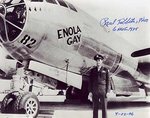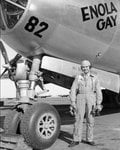syscom3
Pacific Historian
Another legend of aviation has made his final sortie!
RIP sir, and thanks for your service to this country.
Pilot of Hiroshima bomber dies - Military Affairs - MSNBC.com
Pilot of plane that bombed Hiroshima dies
Paul Tibbets, WWII commander of infamous B-29, requested no headstone
COLUMBUS, Ohio - Paul Tibbets, the pilot and commander of the B-29 that dropped the atomic bomb on Hiroshima, Japan, died Thursday, a spokesman said. He was 92.
Tibbets died at his Columbus home after a two month decline from a variety of health problems, said Gerry Newhouse, a longtime friend. Tibbets had requested no funeral and no headstone, fearing it would provide his detractors with a place to protest, Newhouse said.
Tibbets' historic mission in the plane Enola Gay, named for his mother, marked the beginning of the end of World War II. It was the first time man had used nuclear weaponry against his fellow man.
"It's an end of an era," said Newhouse, who served as Tibbets' manager for a decade. "A lot of those guys are gone now."
It was the morning of Aug. 6, 1945, when the plane and its crew of 14 dropped the five-ton "Little Boy" bomb over Hiroshima. The blast killed 70,000 to 100,000 people and injured countless others.
Three days later, the United States dropped a nuclear bomb on Nagasaki, Japan, killing an estimated 40,000 people. Tibbets did not fly in that mission. The Japanese surrendered a few days later, ending the war.
"I knew when I got the assignment it was going to be an emotional thing," Tibbets told The Columbus Dispatch for a story on Aug. 6, 2005, the 60th anniversary of the bomb. "We had feelings, but we had to put them in the background. We knew it was going to kill people right and left. But my one driving interest was to do the best job I could so that we could end the killing as quickly as possible."
Tibbets, then a 30-year-old colonel, never expressed regret over his role. It was, he said, his patriotic duty—the right thing to do.
"I'm not proud that I killed 80,000 people, but I'm proud that I was able to start with nothing, plan it and have it work as perfectly as it did," he said in a 1975 interview.
"You've got to take stock and assess the situation at that time. We were at war. ... You use anything at your disposal. There are no Marquess of Queensberry rules in war.
"I sleep clearly every night."
Paul Warfield Tibbets Jr. was born Feb. 23, 1915, in Quincy, Ill., and spent most of his boyhood in Miami.
He was a student at the University of Cincinnati's medical school when he decided to withdraw in 1937 to enlist in the Army Air Corps.
After the war, Tibbets said in 2005, he was dogged by rumors claiming he was in prison or had committed suicide.
"They said I was crazy, said I was a drunkard, in and out of institutions," he said. "At the time, I was running the National Crisis Center at the Pentagon."
Tibbets retired from the Air Force as a brigadier general in 1966. He later moved to Columbus, where he ran an air taxi service until he retired in 1985.
But his role in the bombing brought him fame — and infamy — throughout his life.
In 1976, he was criticized for re-enacting the bombing during an appearance at a Harlingen, Texas, air show. As he flew a B-29 Superfortress over the show, a bomb set off on the runway below created a mushroom cloud.
He said the display "was not intended to insult anybody," but the Japanese were outraged. The U.S. government later issued a formal apology.
Tibbets again defended the bombing in 1995, when an outcry erupted over a planned 50th anniversary exhibit of the Enola Gay at the Smithsonian Institution.
The museum had planned to mount an exhibit that would have examined the context of the bombing, including the discussion within the Truman administration of whether to use the bomb, the rejection of a demonstration bombing and the selection of the target.
Veterans groups objected, saying the proposed display paid too much attention to Japan's suffering and too little to Japan's brutality during and before World War II, and that it underestimated the number of Americans who would have perished in an invasion.
They said the bombing of Japan was an unmitigated blessing for the United States and the exhibit should say so.
Tibbets denounced it as "a damn big insult."
The museum changed its plan and agreed to display the fuselage of the Enola Gay without commentary, context or analysis.
He told the Dispatch in 2005 that he wanted his ashes scattered over the English Channel, where he loved to fly during the war.
Newhouse, Tibbets' longtime friend, confirmed that Tibbets wanted to be cremated, but he said relatives had not yet determined how he would be laid to rest.




 The dropping of the bombs were too much blow to the Japanese citiznes and in regard of that I would protest against the decisions made by the Allies.
The dropping of the bombs were too much blow to the Japanese citiznes and in regard of that I would protest against the decisions made by the Allies.